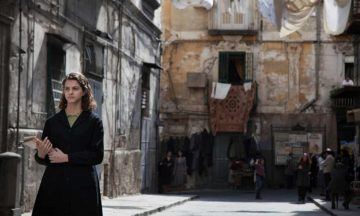Lara Feigel in The Guardian:
 Elena Ferrante is so good on the bodily feelings of female adolescence: the sweaty, clotted skin, the sudden bulges as breasts form, the awkwardly exciting transformations. She is good, also, on the way that childhood friendships change, becoming infused with desire and longing. Her characters startle themselves with their readiness to betray their friends for the newly discovered opposite sex, but they startle themselves too when they jettison their heavy, often rather insulting male suitors and return to their nimbler companions.
Elena Ferrante is so good on the bodily feelings of female adolescence: the sweaty, clotted skin, the sudden bulges as breasts form, the awkwardly exciting transformations. She is good, also, on the way that childhood friendships change, becoming infused with desire and longing. Her characters startle themselves with their readiness to betray their friends for the newly discovered opposite sex, but they startle themselves too when they jettison their heavy, often rather insulting male suitors and return to their nimbler companions.
Her latest novel, The Lying Life of Adults, is set over the protracted years of adolescence, from 12 to 17. The confusion of bodily change provides a murky backdrop for the lucid mental clarity this period of life can bring. These are years when you are an outsider to yourself, unable fully to recognise the person you are becoming, and an outsider to the once familiar figures who surround you. So it’s not surprising that these are often the years when the novelist is born. In this case, Giovanna becomes a novelist through observing the lies of adults , and through learning to tell her own. Giovanna has grown up in Naples, the familiar territory of Ferrante’s quartet. She lives high in the rarefied boulevards of the upper city, but has grown up knowing that there’s another city down below, where her father spent his childhood and his family still live. “To visit them you had to go down, and down, keep going down, into the depths of the depths of Naples.” She is the beloved daughter of two teacher parents, nurtured by the admiration of a father whose violence she nonetheless fears, because periodically he mashes up “sophisticated arguments and uncontrolled emotions”.
More here.
